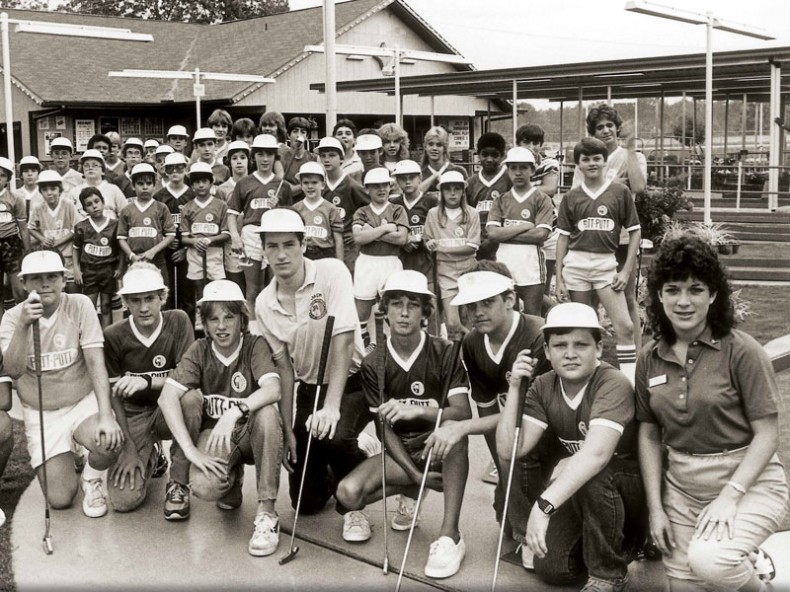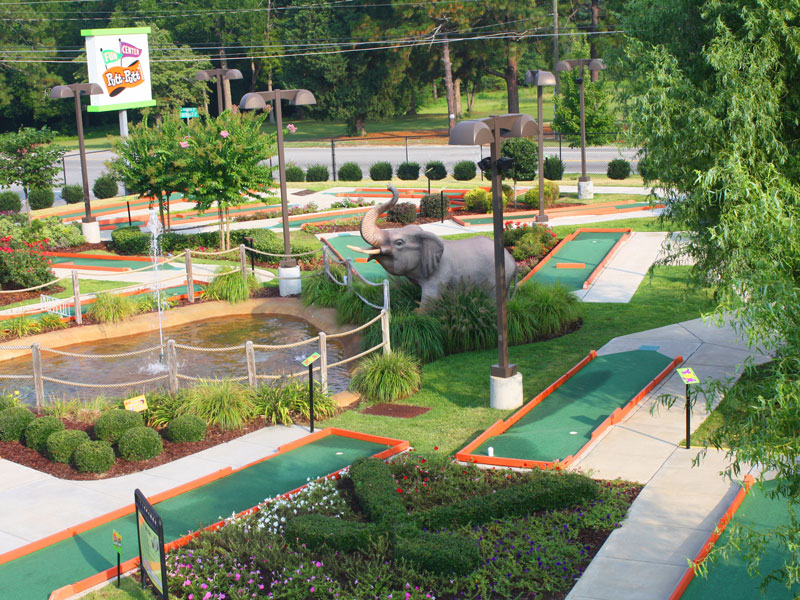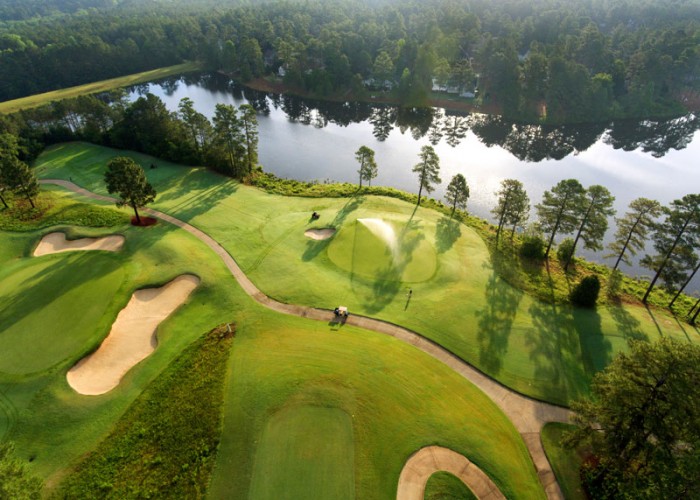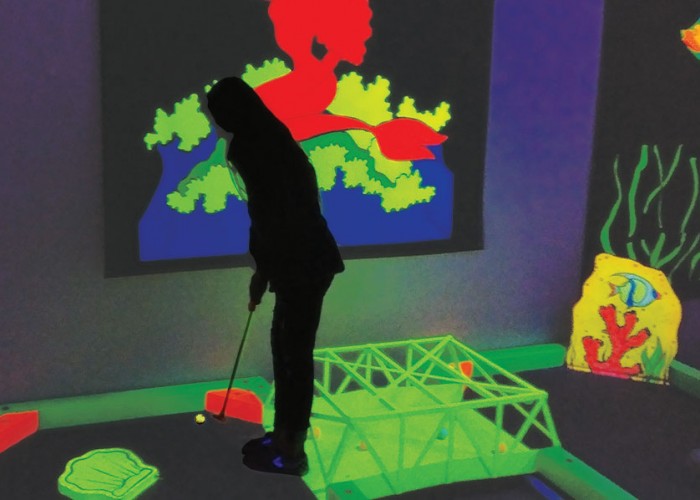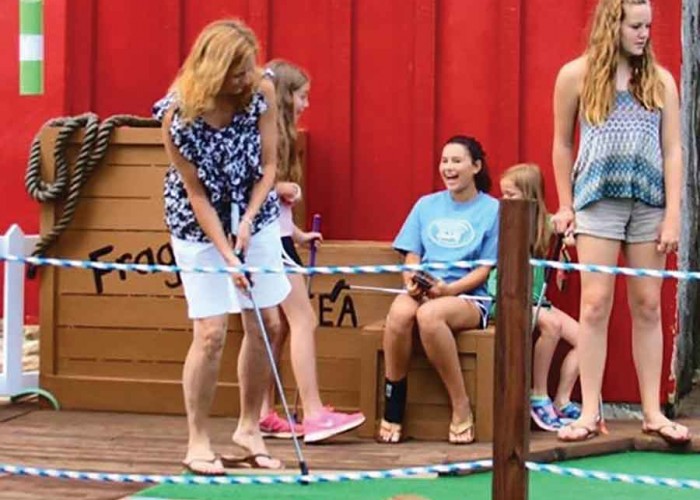Putt-Putt’s NC History: It’s All About the Short Game
Miniature golf has North Carolina roots
By Lori GrossmanMembers of the Junior Putters Association. Photo courtesy of Putt-Putt Fun Center
Mini golf, goofy golf, Putt-Putt, crazy golf — these days, you can find as many variations of miniature golf as there are nicknames for the family friendly putting courses.
Most offer some sort of gimmick, making it obvious that scores — at least when it comes to miniature golf — aren’t the goal. One indoor game is played in a glow-in-the-dark setting. One chain, catering to the over-21 crowd, offers trendy snacks and cocktails. But the strangest of all is a course “laid out” in the basement of a funeral home!
Although many of these very different courses are referred to as “putt-putt,” only one chain is the original, the real deal: Putt-Putt Fun Centers, developed by Fayetteville native Don Clayton in 1954.
Clayton’s Putt-Putt wasn’t the first course, though. That honor belongs to a course that opened in 1867 in St. Andrews, Scotland. That course was called “The Ladies' Putting Club.” The concept caught on and eventually spread to Pinehurst, North Carolina, where wealthy English businessman James Barber hired an architect to create a putting course on his estate. It was called “Thistle Dhu” — a version of what Barber said when he saw the end result (declaring in his British accent, “This’ll do”). The first miniature golf game there, and possibly in the United States, was played in January 1918.
Putt-Putt centers are a place for group participation … People want entertainment in a family-friendly environment. And that’s what we will provide.
Miniature golf’s popularity waxed and waned over the next few decades. Then in 1954, Don Clayton’s doctor ordered him to take a month off from his job selling insurance, fearing he might suffer a nervous breakdown. He was supposed to rest, but instead decided to build his own public miniature golf course. Clayton (then 28 years old) and his father built it for $5,200. The course paid for itself in less than a month, at 25 cents per game (if you do the math, that’s a lot of games). A year later, there were eight locations. By 1957, there were 106.
Clayton wanted to use the name Shady Vale for his new courses, but was a bit confused about the spelling of the word “vale.” When the phrase “Putt-Putt” came to him, he used that instead.
He’d played other courses filled with obstacles like rotating windmills, and clown mouths that opened and closed. Clayton didn’t like them and planned his own version on 3-by-5-inch cards on his dining room table. Clayton’s vision of Putt-Putt would skip all the kitsch and return to golf’s roots. His courses emphasized putting skills, much the same as any golfer would need on a regulation-sized course.
Each of his 18 par-2 holes was plotted out and copyrighted. Each hole utilized outdoor carpet and aluminum bump boards. The bump boards made it possible to lower a golfer’s score if a shot banked off the board at just the correct angle. As Putt-Putt’s popularity grew, Clayton started selling franchises. That allowed the company to spread not only across the country, but around the world as well. By 1994, there were over 400 locations in six countries.
Don Clayton never returned to the insurance business. Putt-Putt’s success made him a multi-millionaire. But times and tastes change. By the time Clayton died in 1996, people wanted more than just miniature golf. When David Callahan (another Fayetteville native) bought out the Clayton family interest, Putt-Putt had begun to slip. He knew changes were needed to bring people back and to keep the game relevant. In 2014, he told a writer for the Fayetteville Observer: “Putt-Putt centers are a place for group participation … People want entertainment in a family-friendly environment. And that’s what we will provide.”
Under the new name Putt-Putt Fun Centers, entertainment options have expanded at most locations. Now, after several competitive games of golf, guests can try out the batting cage, arcade and laser tag. Other favorites such as go-karts, bumper boats and indoor bumper cars have been added. In keeping with efforts to use clean energy, these three are powered by electricity.
As Putt-Putt celebrates its 70th anniversary next year, its mission remains the same. As founder Don Clayton once said: “Our product is very simple. We sell happiness.
-
Golf all around
-
Share this story:

